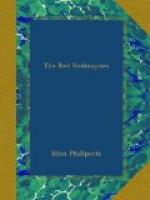He departed therefore at a definite rate of speed and was back again in three quarters of an hour before the dusk had fallen. But he had nothing to report. He had found no cave where he expected one, and now guessed that Robert Redmayne’s secret holt must be nearer than they imagined.
The night came at last—very dark overhead but clear and calm. Beneath “Crow’s Nest” the waves, sunk to nothing, made a quiet whisper along the feet of the precipices and tinkled on the little beaches that here and there broke the cliff line. The tide was just making and midnight had struck when Bendigo Redmayne, in rough-weather kit, stumped down his long flight of steps and went to sea. Brendon and Jenny stood above under the flagstaff, and soon they heard the launch purr away swiftly under the darkness.
The woman spoke first.
“Thank God we are at the end of this horrible suspense,” she said. “It has been a cruel nightmare for me, Mr. Brendon.”
“I have felt much for you, Mrs. Pendean, and admired your marvellous patience.”
“Who could but be patient with the poor wretch? He has paid the price of what he did. Even I can say that. There are worse things than death, Mr. Brendon, and you will presently see them in Robert Redmayne’s eyes. Even Giuseppe was sobered after our first meeting.”
That she should use the Italian’s Christian name so easily struck unreasoning regret into the heart of Mark. It gave him an excuse for a question.
“Do you believe all Doria tells you? Is he regarded here as a domestic or an equal?”
She smiled.
“As a superior rather than an equal. Yes, I see no reason to doubt his story. He is obviously a great gentleman and a man of natural fine feeling. Breeding and education are different things. He has little education, but a native delicacy of mind belongs to him. You feel it.”
“He interests you?”
“He does,” she confessed frankly. “Indeed I owe him something, for he has a wonderful art and tact to strike the right note with me.”
“He has had rare opportunities,” said Brendon grudgingly.
“Yes; but not everybody would have taken them. I came here distracted—half mad. My uncle tried to be kind, but he has no imagination and could rise to nothing higher than reading me passages from ‘Moby Dick.’ Doria was of my own generation and he has a feminine quality that most men lack.”
“I thought women hated feminine qualities in men.”
“Perhaps I misuse my words. I mean that he possesses a quick sympathy and a sort of intuition that are oftener found in a woman than a man.”
Mark was silent and she asked a question.
“I could not fail to note that you do not like him, or if that is too strong, that you see nothing to admire in him. What is there antipathetic in his nature to you, and in yours to him? He doesn’t like you either. Yet you both seem to me such gracious, kindly men. Surely you have no bias against other nationalities—a man with a cosmopolitan record like yours?”




